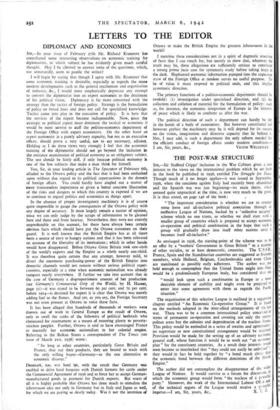THE POST-WAR STRUCTURE
SIR,—Sir Stafford Cripps' inclusion in the War Cabinet gives a new interest to the views on the international problem which he set forth in the book he published in 1936, entitled The Struggle for Peace. Though much of it no longer applies—it was issued in September. 1936, when the sanctions against Italy had recently been abandoned and the Spanish war was just beginning—its main thesis, which seemed quite unpractical at the time, is now very much to the point. It is thus stated, on page 146 of the book: " The important consideration is whether we are to attemrt some loose and all-inclusive political association through an ineffective League of Nations, backed by a 'collective security' scheme which no one trusts, or whether we shall start with smaller group of countries which is prepared to accept economic co-operation and political combination in the hope that such a group will gradually draw into itself other nations until it becomes itself all-inclusive."
As envisaged in 1936, the starting-point of the scheme was to be an offer by a "workers' Government in Great Britain" to a number of other socialist, or at least democratic, countries. The U.S.S.R.. France, Spain and the Scandinavian countries are suggested as founder members, while Holland, Belgium, Czechoslovakia and even China are mentioned as possibly early adherents. The author vat, not bold enough to contemplate that the United States might join what would be a predominantly European body, but considered that the
" would look upon such a combination in Europe as a most desirable element of stability and might even be preparedtc enter into some agreement with them as regards the Pacific situation."
The organisation of this selective League is outlined in a suggestive chapter entitled " An Economic Co-operative Group." It is based on the methods adopted in the inter-allied arrangements of the last war. There was to be a common international policy conceived in terms of permanent co-operation and covering not only the metre. politan areas but the colonies and dependencies of the nucleus States. This policy would be embodied in a series of treaties and agreements: no superstate or new constitutional arrangement would be required- Provision would be made for the setting up of an advisory eccnomic ti general staff, whose function it would be to work out "an economic plan " for the constituent countries. As a result their interests would soon become so interlocked that " they could not easily be unlocked": they would in fact be held together by "a bond much closer than the economic bond between the different dominions of the British Empire."
The author did not contemplate the disappearance of the wider League of Nations. It would survive as a forum for discussion, in which the economic group would form " the nucleus of a ldowerf_.,11/ party." Moreover, the work of the International Labour Oltse of the technical organs of the League would receive a p'1°


























 Previous page
Previous page